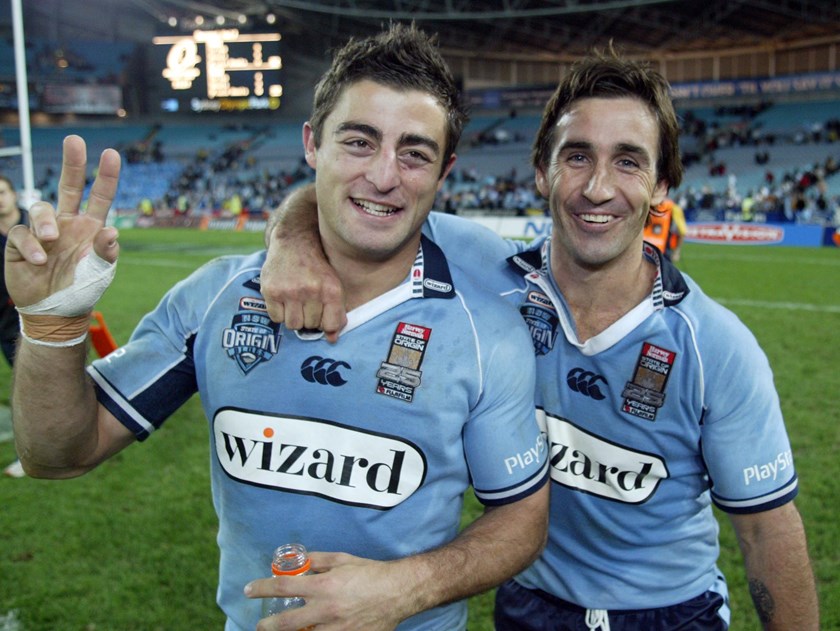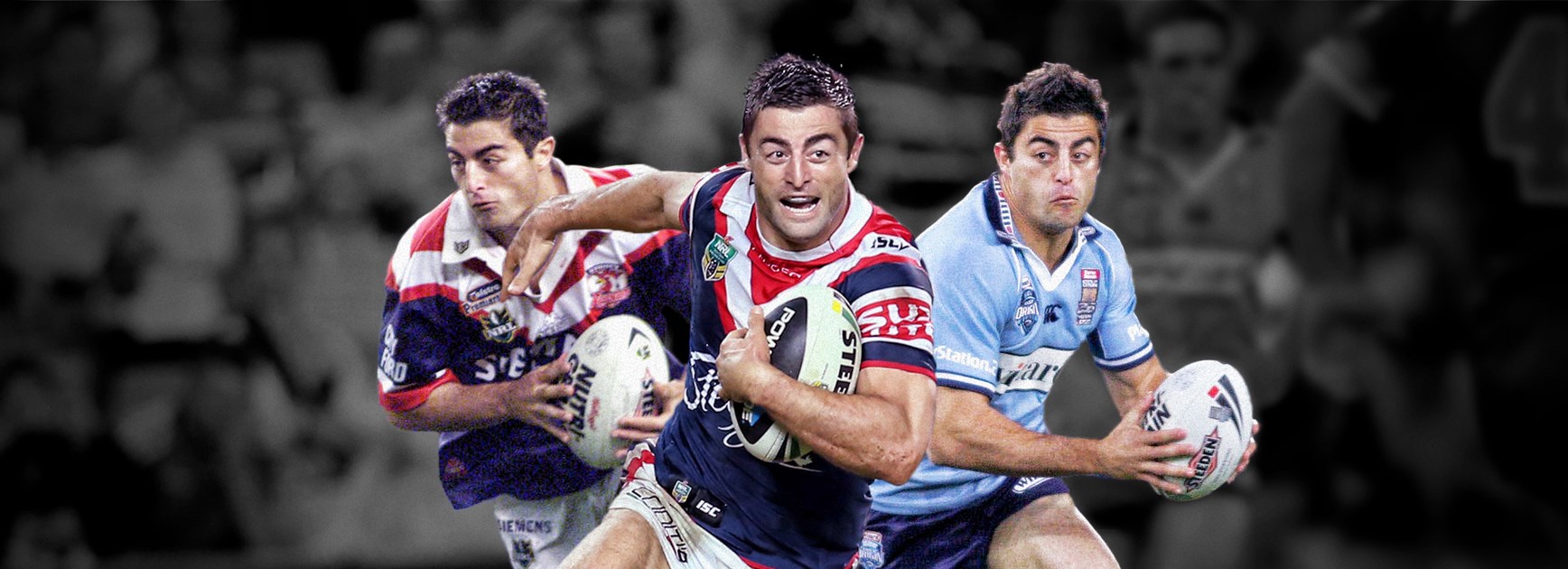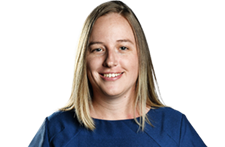Anthony Minichiello's rugby league career started as glamorous as it finished with two premierships, three Origin series wins and a 66.7% win record at the international level with Australia and Italy.
An energetic fullback who loved the big stage, Minichiello's rollercoaster ride between premiership success in 2002 and 2013 was anything but smooth.
His 302 games as a one-club man for the Roosters a great reward for a fan-favourite who never gave up.
NRL.com caught up with Minichiello recently to reflect on a decorated 14-year career in the game that included a golden boot and Wally Lewis Medal win in 2005.
Legend Q&A
You're a south-west Sydney boy, born in Liverpool, so how did you end up in the Eastern Suburbs with the Roosters?
I grew up on five acres and started league when I was 10. Mum used to film every game I played. Arthur Beetson was the recruitment officer at the time and sent someone over to approach mum to see if she had any tapes of me.
I got invited to a three-day camp at Narrabeen and he had a chat to all of us there. I didn't know too much about him but then having him speak you could feel a real presence there.
I signed a two-year deal at 16 and we struck up a great friendship for many years after that.

We know you as 'Mini' for obvious reasons, but you've also got the nickname 'The Count' after Count von Count from Sesame Street – who came up with that?
I always found The Count to be a fans' nickname for me because in footy circles it was obviously 'Mini' or 'Mountain Cat'. But it was actually Brett Kenny when I played my first representative game for City Origin that he said I looked like The Count. That filtered out and the fans got a hold of it.
You made your NRL debut against the Bulldogs in 2000 and it was a wild four-year period for the club that included a premiership and three grand final losses – that must've been a whirlwind period?
I was 19 and for the next five years everything came easy but the way my career panned out you realise how hard it is to win a premiership. In the early 2000s I took things for granted thinking, 'Oh yeah I'm in another grand final, this is easy', and honestly that was my thinking.
But then the downs came and you start realising how hard it is to get to the day itself and then win the day. [Most] players aren't lucky enough to play in one grand final let alone often and I was lucky enough to do that.
It was a special time with a great coach and great players. I started on the wing and ended up at fullback during that period.
Do you feel the team made the most of their opportunities in that period?
We probably should've won one more grand final. In 2004, it was our second loss in a row and that one stung the most. We got outplayed in 2003 by Penrith so could probably accept that a bit more but '04 we were up 13-6 [against Canterbury] and didn't score a point in the second half.
That was most disappointing, you can't go back and change it but those players that I played with during that time, we're all best mates still and all catch up and laugh about the times we had.

Let's talk Origin – you were part of success with NSW when your career in sky blue began in 2003, how do you reflect on that period?
My first Origin game was the opening of Suncorp Stadium and that was the most nervous I'd been for any game I've ever played. I started shakily but then hung around Joey [Andrew Johns] for long enough and he put me in for a couple of tries and I ran for a fair amount of metres.
That really kick-started my rep career and elevated me to another level. I remember looking around and you've got Joey there, Danny Buderus, Mark Gasnier, Brad Fittler, Luke Ricketson and Craig Wing … there was just this great mix of experience and youth.
We're all still great mates and I put it down to having three years together where the team went virtually unchanged. That period between '03-05 was pretty amazing with the combinations that were built and friendships that were made.
You had a very decent injury-free run until 2006 when your back became a big concern – how close did you come to a forced retirement?
I didn't think much of it early because I had played more games than anyone in that three-year period prior so my mindset was just to get the operation done and be back and better in 2007.
It was probably one of the first back operations in the league at the time and I was running within six weeks and pushing myself the same as ever.
I played Origin I in 2007 and was in camp for game two when I rolled out of bed and heard a click in my back. It went into spasms and I laid on the floor and that's where I stayed. I got ruled out and had to go see the surgeon again.
I got asked by the surgeon if I wanted to play contact sport again and I said yes, of course, I'm only 27. I got another operation and there were a few other niggles after that.
In 2008, I had a significant disc bulge in my neck which was only one millimetre away from my spinal cord. That really was the wake-up call then. Any type of hit could've put me in a wheelchair. I had to search deep and reset everything in my lifestyle. I found answers through nutrition and lifestyle modifications to help improve the way I recover.
I thought I was on the right path and then in 2009 I tore three major ligaments in my ankle and fractured my leg. But thankfully, when I did get back, I played my first full season again in 2010 and went on to play another five seasons injury-free after that.
The 2010 season finished with a grand final loss, you lot came out of nowhere...
Yeah, it was a different ride compared to previous grand finals I'd played. We were struggling in the middle of that year but hit some form late. The Dragons were the benchmark but we took a lot of pride out of that finish.
An Origin recall came the following year – that must've been special given everything you had been through?
It was unbelievable. Ricky [Stuart] gave me the call and it was just surreal I was back in that environment again, especially with my wife being at the game and seeing how much I went through with four years of injuries and coming back to play the two games of that series was a great achievement.
We had a near-perfect game of completions in game two to get them at the death and level the series but then went up to Suncorp Stadium for Darren Lockyer's last ever Origin match, and got pumped in the decider. They were way too good for us but it was nice to earn the recall.
Is it true you were told you weren't part of the club's plans beyond the 2012 season by Brian Smith?
Not exactly, I did enjoy Brian's coaching but he lost his way a little bit with the Roosters. He was all about the younger guys coming through. You could feel he wanted to move on some senior players but I was never told.
I had a good relationship with Nick Politis and the club in general. We didn't go well in 2011 and 2012 so the board made changes to the coaching staff and that's where Trent Robinson came in and look at the last six years since then.

What were your first interactions like with Trent?
I remember him ringing me from France and we had a long chat around leadership and what I felt had gone wrong at the club. I said I was keen to captain the side and he took notice of that but didn't make a decision until after Christmas.
He analysed everyone quietly, we had a great pre-season, much harder than previous, and then he called me into his office in January and said you've led all summer, I want you to be captain. That was a nice moment.
We worked together for the next two years and he's easily one of, if not the best coach I've had. The club is just fantastic, it's just a winning culture and that's what we're all about.
Lucky that worked out … you ended up captaining the Roosters to the 2013 premiership – is that your biggest career achievement?
Definitely, to hold up that trophy especially after all the hardship and the space between titles, it meant a lot.
My wife was pregnant at the time and I had my family there. It was just an amazing feeling and happened late enough in my career for me to cherish it more.
Who were some of the biggest influences in your career?
My parents first and foremost ... growing up both didn’t play sport, they worked hard and gave us opportunities to play sport. They always taught my brother, sister and I that you don't get anywhere without hard work ethic.
And then every coach I had, you take bits from all of them. Gus Gould was the first coach I had in the lower grades, Ricky Stuart was the guy who moved me from wing to fullback, Wayne Bennett on tours and then Robbo at the end of my career – all great coaches you take things from.
Freddie [Brad Fittler] as a leader was phenomenal and then playing alongside Joey and Locky – they were my favourite guys to be around – you just played off them and something would happen.

Speaking of Darren Lockyer, he was named fullback for your Test debut against the Kiwis in 2003 but got ruled out – what happened next?
I got named on the wing but when he pulled out with an ankle injury I got moved. I remember he gave me his jersey after the game because I'd played in the five so it was a nice gesture to get the one.
We won comfortably and it was a special moment playing for your country. It was something else. We went on three tours in a row after that and looking back now that was amazing.
What does life look like now for Anthony Minichiello – do you miss playing?
A lot of people say you must miss it given how well the team is going but more than anything I love watching it. I'm six kilos lighter than what I played at so I'd get ragged dolled now by these big guys anyway.
I had a lot to move onto with my health and fitness business MiniFit and that came because of my injuries – I'm really passionate about taking a deep dive down that road.


